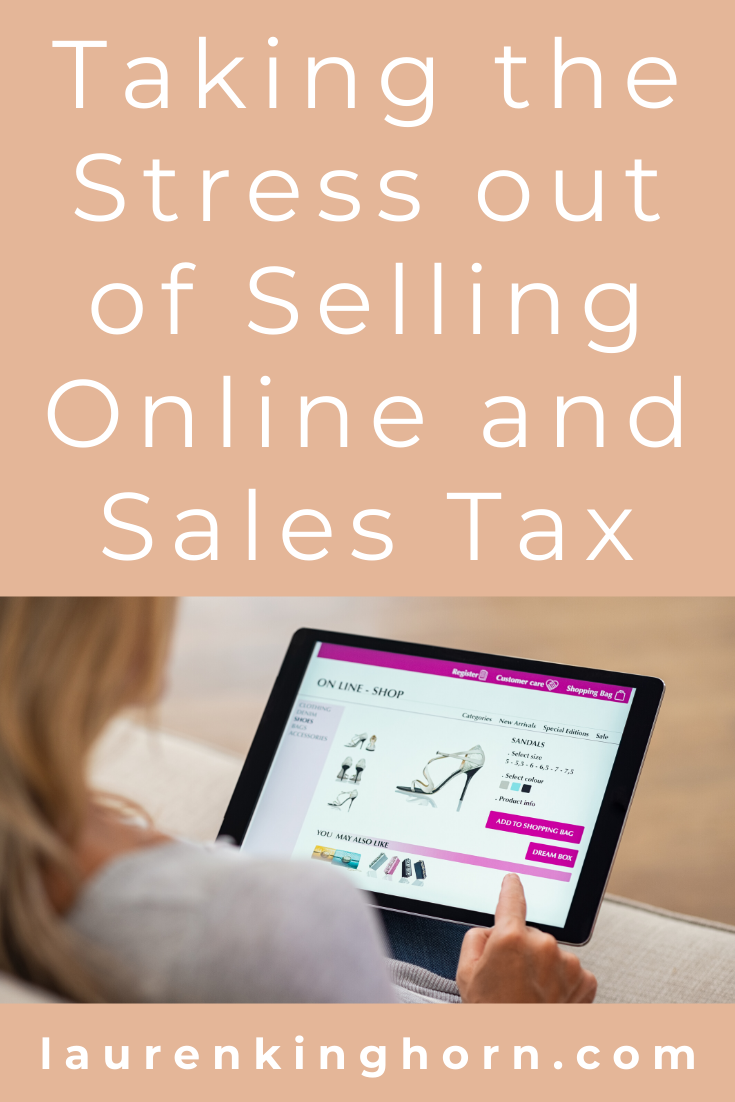I’m busy setting up my dropshipping store at the moment. Having such fun choosing products to sell. One thing that never crossed my mind until today, though, was Sales Tax.
Actually, I’ve been selling online for a while and it never occurred to me to charge Sales Tax on the products and services I sell in my shop. Not until I was asked to write this sponsored post on Sales Tax Compliance, which sent me into deep research mode.
Well, let’s be honest… at first, it sent me into a flat panic. Eek!
Then I did the research and figured out that I don’t have to stress about this, at least not yet – not when I’m just starting out with an online store (and dropshipping on a small scale).
It’s not that I mind paying tax, it’s just that it’s so much work figuring out how much to pay, which is why I outsource this kind of stuff to a good Accounting firm.
So I guess this would be a good time to add a disclaimer:
I’m not an Accountant or a Tax Consultant, I’m a Digital Entrepreneur. All the information below is from my perspective as an online business owner who’s about to become a drop shipper.
If, after reading this post, you are still in doubt about whether you are liable to pay Sales Tax or not, I recommend you get a sales tax audit.
Here’s what I uncovered in my research.
Let’s start by drawing a line between Income Tax and Sales Tax.
What is Income Tax?
Income tax is the money you pay to the government on your taxable income.
We all know (as business owners or employees) that we have to pay income tax and, of course, I’ve been doing that.
The way income tax works is you pay tax to the government of the country you live in, no matter where your customers are in the world or where your income is derived from.
Do I have to pay Income Tax as an Online Seller?
Generally, the answer is yes – especially if you have an online business.
Most countries have a tax threshold, which means that you only have to register to pay income tax once you earn a certain amount annually. However, earning foreign income may have different tax implications.
South African Income Tax
So in my case, I live in South Africa, I’m a Sole Proprietor and am registered as a Provisional Tax Payer.
I pay provisional tax here in South Africa on the profit I make as a business owner, even though most of my income comes from the USA, UK and Australia.
I convert all my income into Dollars (USD) before I transfer it from Paypal and then it’s converted into Rands (our currency) when I transfer it in my South African bank account. Then I work out my income tax based on the Rand value of my business earnings less my business deductions.
Twice a year I submit Provisional Tax and once a year I submit an income tax return (so far there’s been no money to pay out on the income tax return because it’s been covered already in Provisional Tax).
Who is liable to pay income tax in South Africa?
In South Africa, the income tax threshold for 2020 is R 79,000 a year for people under the age of 65 and R 136,760 for people over the age of 65. If you earn less than R 500,000 a year (from one employer), you don’t have to submit an income tax return.
However, there are a couple of important considerations.
1. If you receive income from many sources (not just one employer) you have to register to pay tax.
2. If you receive income from outside the country (remuneration for foreign services rendered), you have to submit a tax return (even if you’ve earned less than R 500,000).
So in my case, I’m liable to pay income tax on both counts. I earn from multiple sources and I earn foreign income.
What are the Tax Laws in my Country?
It’s really important that you research the tax laws in your own country of residence because tax laws differ from country to country.
In America, for example, the tax laws even differ from State to State. US residents pay Federal Income Tax to the US Government as well as State taxes in some States.

What is Sales Tax?
Sales Tax is the tax placed by a Government or a State on certain goods sold.
If you’re selling products or services, some governments and some States in the USA request.
In the UK and South Africa, it’s called VAT (Value Added Tax), in New Zealand and Australia, it’s called GST (General Sales Tax).
Some States in the USA are Sales Tax Havens.
Do I have to pay Sales Tax as an Online Seller?
Most dropshippers don’t have to pay sales tax when they purchase goods from a manufacturer, wholesaler or dropshipping supplier.
in the States, when you buy something for resale, you qualify for a sales tax exemption but to take advantage of this, you need to apply for an official exemption license (or resale certificate).
Do I have to charge Sales Tax as an Online Seller?
Here’s where things get a little complicated, but let me just say, right off the bat, that in most cases you will not have to charge sales tax when you’re first starting out as a Dropshipper.
If, however, you build a very successful online store, you’ll probably be liable for sales tax (just as any other store owner).
Sales Tax Regulations
Again, sales tax regulations differ country by country but I’m going to focus on the USA (as that’s where most of my audience is) and South Africa, as that’s where I live.
Do I have to collect and pay Sales Tax in the USA?
Before June 21, 2018, when the Wayfair Act was passed, you only had to collect tax from your customers in the United States if you had Nexus in a State that levied sales taxes.
What is Nexus?
Nexus is a legal term meaning you have a sufficiently large physical presence in a State that requires you to pay sales tax. For example, if you live in the State or have an office property in the State.
So for dropshippers who don’t live in the USA, like me here in South Africa, or someone in the UK, Australia, Europe or anywhere else in the world, this means we were not required to collect sales tax from US customers or pay sales tax in the US.
What is Wayfair Nexus?
However, there was a new Supreme Court ruling on 21st June 2018 known as the Wayfair Ruling.
The new law says that Sales Tax Nexus can be applied if you don’t have a physical presence in a state but are making $100,000 in Sales or making 200 Sales in a State.
Which means that any US State can now require that remote retailers collect and pay sales tax. Fortunately, most States have not passed this legislature.
For now, if you’re new to dropshipping, sales tax will not apply as this bill was aimed mainly at large online retailers.
Mostly, you’ll only have Nexus if you live in a State or have property in it and the law is not going to affect you until you start making lots of money.
If you’re confused by any of this, I found a brilliant video on YouTube by Sarah of Wholesale Ted.
Do I have to collect and pay Sales Tax in South Africa?
So my next question, of course, do I have to register as a VAT vendor and start charging VAT?
Yes and No.
If you own an online store, and South Africans buy products from your store, you have to charge 15% VAT on all VAT-able products. However, you don’t have to charge VAT if your customers buy from anywhere else in the world.
Yet again, the answer for me is no, for now, because I don’t have to register as a VAT Vendor until I’m doing over R 1 million in sales a year. I’m guessing that’s going to take a while.
So what I discovered in my research is that I’m in the clear when it comes to Sales Tax, for now.
Phew! One thing less to worry about.
And by the time I’m selling that many goodies in my dropshipping store, I will happily be able to afford a brilliant Accountant to handle all my tax submissions for me.
Hope when you do your research on your countries tax laws, you find happy news too.
Let’s do a quick poll. In the comments below, let me know which country you come from and whether you have to collect and pay Sales Tax to your government on the goods you sell online.
*This post was sponsored by Tax Connex, who take the headache out of Sales Tax in the United States. Writing sponsored posts is just one of the ways I earn income from my blogs. All opinions are my own.

